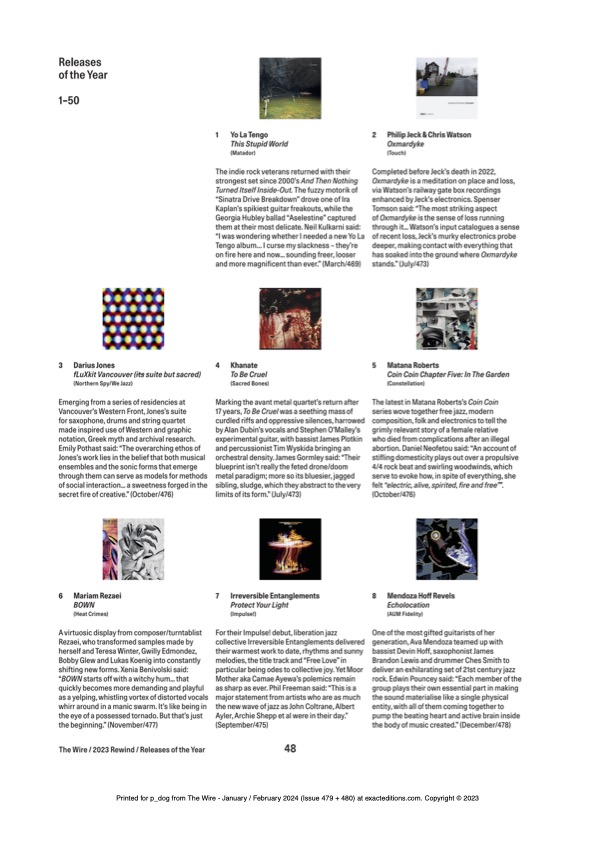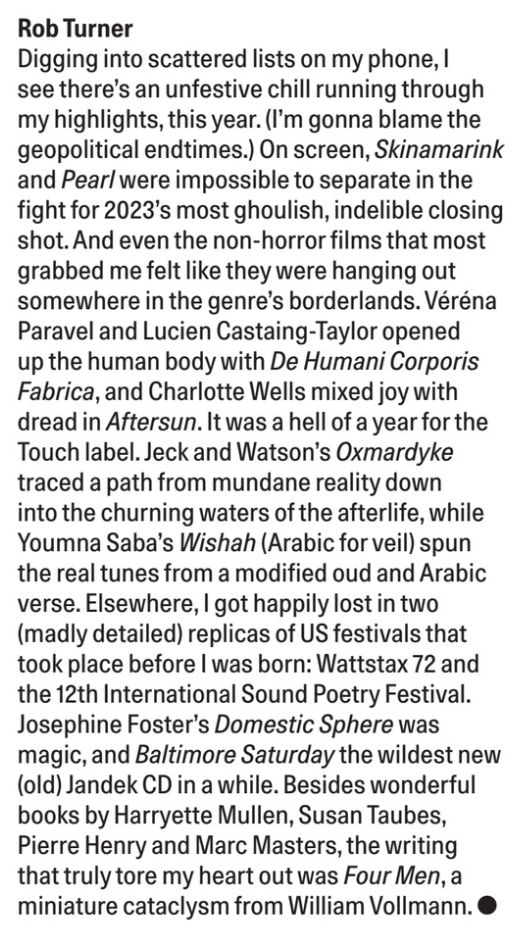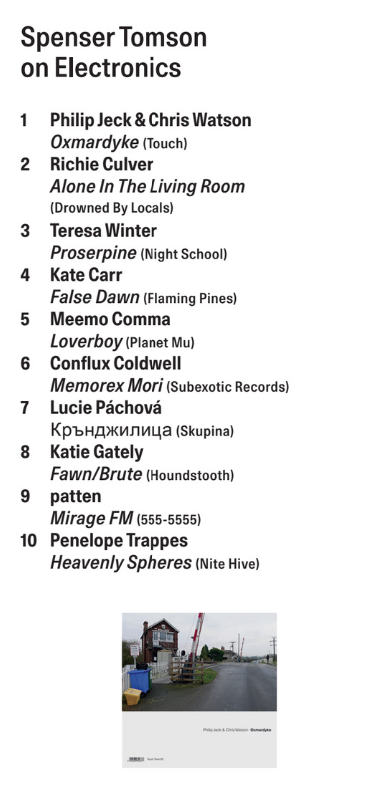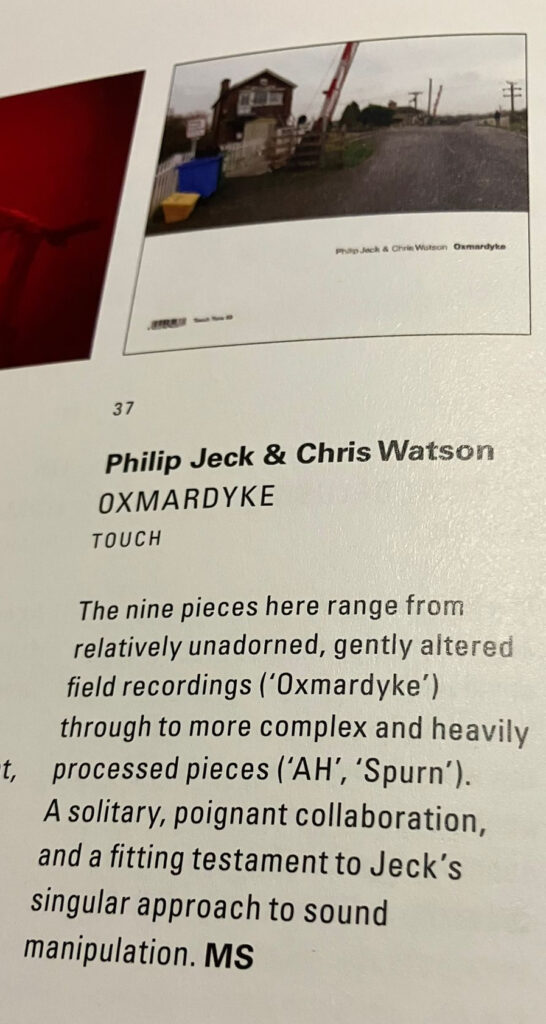
Artist: Philip Jeck & Chris Watson
Title: Oxmardyke
Formats: CD & Digital Download
Catalogue Number: Tone 83
Street date: 16th June, 2023
You can order this CD album here
Track Listing:
1. Oxmardyke
2. Barn’ – click to listen
3. Beetroot Train
4. Coop
5. Drum
6. AH
7. Bridge
8. Salt End
9. Spurn
Mastered by Denis Blackham at Skye Mastering
Photography by Chris Watson. Cover design: Jon Wozencroft
With thanks to Mary Prestidge, who writes:
“At the end of January 2022 Philip was taken to A&E at the Royal Liverpool University Hospital suffering from severe back pain and was admitted for investigations. In the hospital ward, with some strong pain relief, he could more comfortably rest, mostly horizontally. During the day he could be angled slightly toward a sitting position.
Over the following days, aiming to make sense of his current predicament, Philip regained a tiny level of normality. With his laptop in place he tapped into familiar territory and, when finding the most favourable times, listened to and worked with the sound files that Chris Watson had sent him.
During these brief, intense spells Philip gave all to his ear and heart to guide and shape the music forming at his fingertips. Oxmardyke is the album which resulted from this collaboration.”
Chris Watson:
“Philip’s laugh was infectious. Our conversations would usually begin with exchanges around the enthusiasm we had for each other’s work and the respect we shared for other Touch artists. However, as we were most likely to have met over drinks at the Philharmonic Dining Rooms in Liverpool the evening would gradually dissolve into convivial disarray. What did emerge from these soirées over recent years was a desire to find ways and means for us to collaborate at a place where our ideas converged.
In 2017 I was recording along the north bank of the Humber estuary and one morning driving back from Faxfleet I was stopped at the Oxmardyke rail crossing. The gates were down. After setting up a microphone array by the tracks for a passing freight train the signalman shouted an invitation to climb up into the gate box to make some more recordings.
Over the following weeks I made several return trips to Oxmardyke and gathered a broad palette of recordings. I discussed the sounds, stories and history of the site with Philip after a show and we were both excited by the potential of making a work together.
Philip was drawn to the ancient history of the area from 6th century Anglo-Saxon times to the Knights Templar and how the sounds, rhythms and textures from those periods may still inhabit the contemporary landscape. My thoughts took inspiration from ‘The Signalman’ by Charles Dickens and the painting ‘Rain, Steam and Speed’ by Joseph Mallord William Turner. We agreed to share ideas and exchange tracks.
Oxmardyke gate box has now passed into history.
I hope my contributions may frame Philip’s exceptional work.” [August 2022]
Reviews:
The Quietus (UK): 21/100 Albums of the Year
Boomkat (UK):
Before Philip Jeck passed away last Spring, he worked with Chris Watson on material the field recordist collected from Yorkshire’s Oxmardyke rail crossing, bringing out the region’s ancient rhythms and blurring them into the contemporary landscape.
Watson and Jeck had long been fascinated by each other’s work, and while they collaborated here and there, Oxmardyke is their only full-length outing as a duo. It began when Watson recorded material on the north bank of the Humber estuary in 2017; he stopped at the now defunct Oxmardyke rail crossing and set up his microphones alongside the train tracks so he could capture the sound of a freight train, before the signalman invited him up to the gate box to record more detailed audio. After returning to the site to gather more recordings, Watson connected with Jeck and the two began to plan their collaboration, diving deep into the history of the region to embellish the environmental recordings. The two shuttled tracks back and forth, ruminating on its themes, and when Touch’s Mike Harding notified Watson of Jeck’s illness, they quickened the pace.
“I sincerely hope that my contributions may frame Philip’s exceptional work,” Watson writes. He didn’t have to worry – the music is a fitting coda to Jeck’s estimable canon, swaying between realism and abstraction as dazzlingly vivid field recordings transform into glassy drones and chugging engines become thudding, ancient rhythms. The title track plays like a blueprint; allowing only the gentlest drones to poke through the duo’s impressionistic haze. On ‘Beetroot Train’, what sounds like a 4/4 kick intensifies and decelerates into a painterly mess of vamps and twanging, pitch-fucked plucks. The duo nudge into horror territory on ‘Coop’, stretching bell sounds that ring out across the expanse of countryside, losing tense harmonies in billowing clouds of sonic vapour.
It’s a folk horror soundtrack that’s of the land, but also lashed to each artist’s specific set of skills. Watson’s pristine snapshots are the ideal way to broadcast a here and now that sings of our era’s post-industrial conflict, while Jeck’s contributions add a pinch of magick that’s hard to quantify. ‘Drum’ is a perfect example, all dense, industrial whooshes and hoarse whirrs punctuated by birdsong and barely-audible musical traces. On ‘AH’ the music is even more tense and foreboding, with railway signals forming incessant rhythmic circles, train horns bent into swooping melodies.
Needless to say, if you enjoyed Mark Jenkins’ recent ‘Enys Men‘ soundtrack, or recent material from Akira Rabelais, this is gonna hit a sweet spot. But there are few other artists able to capture such a peculiar (and particularly British) mood. It’s like hearing an audio treatment of M. R. James’s most unsettling short stories – tales that leave you in a cold sweat.
The Quietus ALBUM OF THE WEEK 15.06.2023:
Across The Tracks: Oxmardyke By Philip Jeck & Chris Watson
The final album from the late Philip Jeck is a touching collaboration with master field recordist Chris Watson, focused on a level crossing near Hull.
When Chris Watson travelled by the Oxmardyke rail crossing in 2017, he found its sound to be enticing. So he returned to the place for a few weeks, gathering new tape with each excursion. These field recordings sound of industry and nature in harmony – as trains rush by and birds swarm around them, chirping through the metallic scratches and gusts of wind and dust. He later sent these recordings to his friend Philip Jeck, who took them and transformed them using his laptop, creating impressions of the place through tactile sound. Jeck’s resulting mix, Oxmardyke, finds a careful balance between the two artists’ quintessential styles, mixing Watson’s crisp field recordings and Jeck’s broad-stroked swathes of sound.
Jeck and Watson, both mainstays of the Touch record label catalogue, were longtime friends. In his liner notes accompanying the release, Watson remembers how he and Jeck got to know each other over drinks at the Philharmonic Dining Rooms, indulging in a good bit of merriment but also discussing making music together someday. After one post-show conversation about the sound and history of the area around the Oxmardyke crossing, it was clear that Watson’s Oxmardyke rail crossing recordings could be a good fit for uniting their visions, particularly blending Watson’s interest in recording the world with precision and Jeck’s curiosity about how the past may still haunt the present.
Oxmardyke came to fruition just before Jeck’s untimely passing in 2022, during moments in which his pain subsided enough that he could work on his laptop. The music he makes here reflects his classic textural sound and collaborations like 2021’s Stardust, in which he distorted recordings made by Faith Coloccia that revolved around motherhood. To make Oxmardyke, he took the sounds Watson captured – many different bird calls and metallic screeches of passing freight trains – and toyed with them, ultimately creating eerie music. Jeck’s penchant for vivid sound bolsters Watson’s keen eye for the most affecting sounds of nature, unearthing the emotions hidden inside of them.
Place feels both literal and metaphorical on Oxmardyke. When thinking about this music, Watson cites JMW Turner’s ‘Rain, Steam and Speed’ as an inspiration; the painting depicts the clash of nature and industry in sullen earth tones, not unlike the recordings he captured. Jeck cites Oxmardyke’s history of the Knights Templar of the sixth century; he imagines their ghosts still floating around the place. The music often feels reminiscent of these artefacts, playing with the push and pull between past and present and electronics and nature, but much of the album’s sounds are razor-sharp, made of pointed strokes that carve out the edges of each image they create. In an interview with Ged Barry, Jeck noted that he likes to paint with sound; in practice, his music mixes colours together to create sweeping odes. Here, the hues he chooses often feel dark, reminiscent of the long-gone history that inspired him, while pristine fragments of the field recordings pop in and out of the fold.
The balance between cinematic sound and intricate detail is most evident on tracks like ‘AH’, where a chorus of birds, trilling in high pitched calls to each other, give way to a pulsing siren. It’s an ominous track: rolling, percussive sounds give way to thunderous swathes of sound that often feel alarming. But when those electronic noises pull away, what’s left is chattering birds. You might imagine the serenity of watching them fly above you or pick at the grass nearby. Elsewhere, razor-sharp sounds slice through Watson’s recordings, disrupting the placid landscapes he captured. Tracks like ‘Bridge’, which is glassier, still features piercing metallic scrapes that slice and shock; the music is never in one place for two long, as jarring moments disrupt every silence, bringing with them a harrowing feeling.
While Oxmardyke is layered and intricate, there’s a sense of hollowness and ominousness that rings throughout. The phrases that interweave and braid together on each track often fade out, leaving a hole in their wake. Tracks like ‘Barn’ sound cavernous – the music here is made of rounded pulses and some shrill squeals that circle around them, but when they disappear, all that’s left is a sense of lamentation. ‘Drum’ builds from a glossy surface, only to fall away into a bunch of shards that splinter like broken glass. It evokes both fear and appreciation, like how beauty and destruction go hand-in-hand when outside.
But perhaps the most moving moments are those in which the music leaves space for quiet reflection. Nowhere is nostalgia stronger than on the closer ‘Spurn’, which drops us in what feels like a peaceful setting of birds and gentle breezes. In contrast, fiery drones circle around them, creating a filmy sound that almost drowns out the recordings – but not quite. It’s as if an idea is just coming in and out of focus; it’s almost complete, but a few pieces are missing. When the track cuts out, all that’s left is the feeling of a memory that’s almost close enough to grasp, yet too far away to hold. [Vanessa Ague]
and No. 28 in Best Albums of the Year so far [1st July 2023]:
Oxmardyke came to fruition just before Philip Jeck’s untimely passing in 2022, during moments in which his pain subsided enough that he could work on his laptop. The music he makes here reflects his classic textural sound and collaborations like 2021’s Stardust, in which he distorted recordings made by Faith Coloccia that revolved around motherhood. To make Oxmardyke, he took the sounds Chris Watson captured – different bird calls and metallic screeches of passing freight trains – and toyed with them, ultimately creating eerie music. Jeck’s penchant for vivid sound bolsters Watson’s keen eye for the most affecting sounds of nature, unearthing the emotions hidden inside of them. [Vanessa Ague]
The Wire (UK):
The Oxmardyke Gate Box lies on the York to Hull railway line which bisects the East Riding of Yorkshire. Or, rather, it used to. The site was decommissioned sometime around 2018, but while it was still functioning in 2017, sound recordist and musician Chris Watson made a series of recordings, inspired by the railway imagery of Charles Dickens’s The Signal-Man and JMW Turner’s Rain, Steam And Speed. Philip Jeck died in 2022, but before his death he was able to collaborate with Watson on what would become Oxmardyke.
The album begins with the title track, the twitter and chirp of birds momentarily interrupted by the sharp alarm sound of a railway crossing about to become active as Jeck drifts cirrus-like textures across the scene. Rather than warning the arrival of a train, these translucent electronics indicate that something else, something older than the railway infrastructure is present here. On ‘Barn’, Watson’s climatic sounds are matched with a steam powered rumble, while ‘AH’ whips up the clang of old industry across chattering gulls. Rather than Dickens or Turner, these pieces evoke more closely the uncanny tales of LTC Rolt or Robert Aickman, Jeck’s additions burrowing beneath Watson’s surface residuals to find something stranger in the soil.
The most striking aspect of Oxmardyke is the sense of loss running through it – knowing that Jeck passed away after creating the record combined with the fact that the location itself is now no longer in use, that reaction is to be expected. That sense feels physically ingrained in the pieces: ‘Coop’ sounds as though its drones are seeping away into the earth, while the more caustic ‘Drum’ scours it to ensure any traces are erased. While Watson’s input catalogues a sense of recent loss, Jeck’s murky electronics probe deeper, making contact with everything that has soaked into the ground where Oxmardyke’stands. [Spenser Tomson]
Salt Peanuts (Sweden):
Oxmardyke is the final work of British multimedia artist and pioneer turntablist who passed away untimely in March 2022, and is a true homage to his exceptional sonic vision.
Jeck, while being hospitalised due to severe back pains, mixed and edited field recordings that his close friend, sound artist Chris Watson (known as a founding member of the experimental Cabaret Voltaire band) recorded at Yorkshire’s Oxmardyke rail crossing over a few weeks. This album is Jeck and Watson’s only full-length album as a duo.
Watson discussed with Jeck the sounds, stories and history of the site, and both artists found inspiration from different sources. Jeck was drawn to the ancient history of the area from the 6th-century Anglo-Saxon times to the Knights Templar and how the sounds, rhythms and textures from those periods may still inhabit the contemporary landscape. Watson took inspiration from The Signalman by Charles Dickens and the painting Rain, Steam and Speed by Joseph Mallord William Turner.
Jeck and Watson managed to create an untimely and quite tangible, cinematic story about a meeting point of nature – with many types of bird calls – and modern industry’s rhythmic patterns – the processed sounds of freight trains. This meeting point may sound at first innocent and peaceful but Oxmardyke suggests more highly nuanced, abstract, impressionist and unsettling reflections and perspectives – and, obviously, vivid sonic layers and resonating pulses – about the clash of industry and nature. Furthermore, this album focuses on how the history of this specific location still haunts its present. Especially now that the Oxmardyke gate box has passed into history. [Eyal Hareuveni]
Bandcamp (US):
Oxmardyke is the last album by the late, great Philip Jeck, completed during moments of relative comfort while in the hospital at the end of his life. The album resulted from conversations Jeck had with friend, field recordist, and longtime Touch colleague Chris Watson. Watson had stopped by the Oxmardyke rail crossing in Yorkshire to record a passing train when the signalman invited him into the gate box to continue recording. For several weeks in 2017, he returned to create a series of recordings of trains passing and of the surrounding environment. While Watson was fascinated by the trains themselves, inspired by Charles Dickens’s story ‘The Signalman’ and J.M.W. Turner’s painting ‘Rain, Steam, and Speed – The Great Western Railway,’ Jeck expressed interest in the natural sounds that persist there from the Anglo-Saxon period to today. On the record, Watson captures the modern clamour of the crossing in brilliantly clear recordings. Jeck then overlays slow-moving phantasms of hum and static, as if the area is haunted by its long history. Oxmardyke is about metaphorical crossings as much as literal ones – crossing over distances, crossing through time, crossing one another’s paths in life – making the album both a fitting farewell from Jeck and a beautiful eulogy from Watson. [Matthew Blackwell]
a closer listen (US):
Oxmardyke is both heartrending and inspiring, suffused with a melancholic character revealed only by the backstory. The ears receive it as a celebration of life. These are Philip Jeck‘s final sonic offerings (although we may yet hear unreleased work from the artist). Chris Watson relays the tale with heartfelt words. Watson had made a series of recordings at the Oxmardyke rail crossing and after some conversation had shared them with Jeck, who was fascinated by the area’s history. In January 2022, Jeck was admitted to the hospital. In precious, all-too-brief moments, he found relief from the pain, sitting up, working with these sounds on his laptop: remembering who he was, perhaps reflecting on his legacy, sharing his talents with the world for what would be the final time.
It is impossible to separate the contributions of the artists on this record, nor would we wish to: Oxmardyke is a collaboration of mutual friendship and respect. Jeck’s groundbreaking work with turntables and loops has already found a place in music lore, while Watson, perhaps more than any single artist, has helped to bring field recordings to the attention of the mainstream.
One can only speculate on Jeck’s thoughts, but it’s reasonable to guess that he may have felt an affinity with the Oxmardyke gates, knowing that they had since closed, while their sonic echoes remained. One recalls the history of the crossing through sonic prompts, in the same manner as listeners now recall Jeck, making this set all the more poignant.
Jeck slows sound, then magnifies it, like a scientist returning to a slide. In ‘Coop,’ the loops are pulled like taffy, while the birdsong is crisp and clear: a collision of nostalgia and reality. ‘Drum’ drops hints of sonic ballroom into a mist of squawking seagulls. Notes emerge as if from a locked basement. A train passes, seemingly without slowing. When the brakes are eventually applied, no one seems to depart. Is this a ghost train? If so, it echoes Watson’s own ‘El Tren Fantasma‘ (2011), the attention of ‘AH’ diverted to rustling tracks and descending glissandos, like fading signals.
By ‘Salt End’ the rain has begun to fall, but life goes on, despite the title. The clouds are closing around Jeck. The sirens are starting to sound. The artist says, “I still have more to give,” and he does. A distant announcement is made. Perhaps Jeck hears it as a boarding call: but not yet, not just yet. There are still greetings and goodbyes, arrivals and departures. One can imagine the artist rising from his bed, taking a last look around, and boarding the last train before the station itself is closed. Watson enters the room, sees his final notes and completes his final elegy. In the final piece, the train horn sounds as the waves crash against the shore. Both fall silent; all falls silent. But their sounds are not forgotten. [Richard Allen]
The Wire 2023 Round Up:
Electronic Sound (UK):
37/50 in the annual releases chart
Bandcamp: Best Field Recordings of 2023
Philip Jeck’s passing in March 2022 was an astonishing loss to experimental music, but this collaborative album between Jeck and legendary field recordist Chris Watson is a welcome last statement. Having planned to collaborate with Jeck for years, Watson finally exchanged recordings with him after learning of his condition in the hospital. The files he sent were recorded at the Oxmardyke rail crossing outside of Hull, England, and featured passing freight trains as well as the surrounding countryside. From his hospital bed, Jeck used moments when he felt most comfortable to focus on these tracks, transforming Watson’s crystal-clear recordings into soundscapes that hum and whisper with eerie beauty. According to his partner, Mary Prestidge, “During these brief, intense spells Philip gave all to his ear and heart to guide and shape the music forming at his fingertips.” We’re eternally thankful that he did. [Matthew Blackwell]
A Closer Listen (USA):
Stop. Look. Listen. Beware of trains. If sound waves vibrating just below our range of hearing can produce hauntings and feelings of dread, Philip Jeck seems to conjure up ghostly visitations through the careful manipulation of field recordings taken by Chris Watson at the Oxmardyke rail crossing on Tongue Lane in Yorkshire. The sense of transcendence is evident in the interplay between natural and mechanical sounds where the spacious aural environment recreated points firmly to what lies beyond. Oxmardyke is a result of sympathetic resonance between two sound artists, testament to their unique connection. [Gianmarco Del Re]
and 9/20 2023 chart in the same publication:
Oxmardyke would have appeared on this list even if it weren’t the last work by the late Philip Jeck, but that fact undoubtably lends extra weight to this collaboration with Chris Watson. Jeck edited and manipulated Watson’s recordings from his hospital bed (not unlike the production of J Dilla’s Donuts), though this is not necessarily palpable in the music itself. The long-in-the-works collaboration between two titans of the underground is, perhaps more to the point, the result of a collaboration between two friends. Beyond his work with Cabaret Voltaire and Hafler Trio, Watson has become internationally recognized as one of the world’s premiere field recordists, as comfortable recording wildlife sounds for the BBC as creating sound art installations. Watson gave recordings made at the Oxmardyke rail crossing to Jeck, who was fascinated by the area’s history, including connections to the Knights Templar.
Best known for his idiosyncratic approach to vinyl manipulation, Jeck digitally manipulates Watson tape in ways that call into question the supposed distinction between the natural and the non-. On some tracks Jeck’s touch is subtle, others less so, but Oxmardyke is a true collaboration, sounding like both and neither at the same time. The backstory of Oxmardyke the album, like the history of Oxmardyke the place, lends additional significance to these sounds, but true to the calibre of these two artists, the record stands on its own as a deeply compelling work of art. [Joseph Sannicandro]














